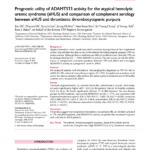If there is no cure for aHUS then remission is a disease free state which is possible for aHUS patients. Patients ask:
Are there long-term studies of outcomes of those in remission from aHUS whether treated by a complement inhibitor or not?
Our expert said:
“Long-term studies of outcomes for individuals with atypical hemolytic uremic syndrome (aHUS), particularly those in remission, are valuable for understanding the course of the condition and the effects of different treatments. These studies can provide insights into the long-term prognosis, complications, and quality of life for aHUS patients. Some key points to consider:
- Complement Inhibitors: Studies examining the long-term outcomes of aHUS patients treated with complement inhibitors like eculizumab (Soliris) have shown positive results, including maintenance of remission and improved kidney function.
- Spontaneous Remission: In some cases, individuals with aHUS experience spontaneous remission without the need for complement inhibitors. Long-term studies can help track the outcomes of these patients and identify factors associated with remission.
- Kidney Function: Long-term studies often focus on kidney function and the risk of developing chronic kidney disease or other kidney-related complications.
- Quality of Life: Assessing the impact of aHUS and its treatment on the quality of life, including physical and psychological well-being, is an important aspect of long-term studies.
- Risk of Relapse: Understanding the risk of relapse in aHUS patients, even after a period of remission, is a crucial aspect of long-term research.
Long-term studies may be conducted by healthcare institutions, research organizations, or patient advocacy groups to provide a comprehensive view of aHUS outcomes over extended periods. These studies help inform treatment decisions and improve the care and support provided to individuals with aHUS.”
There are many databases/ registries including aHUS patients who have or never have been on complement inhibitor treatment. So collectively, there is lot of data available. So there the answer is “yes”. Has there been specific data published? Nothing “collectively” from major databases/registries can be found. But rarely would this be studied or reported. The occasional case study perhaps!
But how long is “ long term” , five , ten , twenty five , or forty years, a life time.aHUS patients existed before the advent of complement inhibitors. Some albeit in kidney failure and on dialysis will have not had another episode of aHUS for over 20 years.
The focus of such studies is usually on complement inhibitor treatment withdrawal and not those who went into remission without complement inhibition, when maybe plasma therapy worked. It would be worthwhile understanding what might be different about them and why those on dialysis can go into a disease free state without treatment. It could help with understanding the treatment withdrawal outcomes.
But some people will not go into a remission and need help from a complement inhibitor. Some may go into remission for relatively long periods to be worth not being treated for that time. Some may go into remission for the rest of their lives. Science now needs to identify even more precisely which patients fit into a remission or temporary or no remission prognosis. Is it 33.3% of patients in each category.
Article No. 632
Previous article

aHUS- when PEX is a success
Article No. 314 28 January 2020 One of the interests of the aHUS patient community is whether remission from treatment can continue and if it does what makes those who go into…

